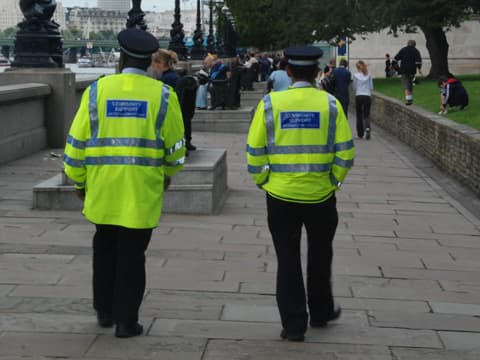The incident came to light during research by Amateur Photographer (AP) that also uncovered apparent flaws in the systems used by one in four police forces to retrieve crucial details of legal claims made against them by the public.
The photographer was stopped in Caerphilly, South Wales, under the police ‘stop and account’ procedure, where an officer is entitled to stop a person and require them to account for their actions.
Gwent Police, which released the information to AP via a Freedom of Information (FoI) request, said it would only release further details on submission of another FoI.
The incident took place in 2012. Asked whether the matter has been settled, Gwent Police told AP: ‘The matter has been denied. It is therefore a matter for the claimant to consider whether legal action will be pursued.’
Gwent Police refused to pay out on what it called an ‘unresolved’ case and did not disclose what the photographer was taking pictures of, saying: ‘This information is currently disputed.’
The force says its records do not indicate whether the photographer is an amateur or a professional.
Nationwide survey
The episode was exposed after AP sent FoI requests to 43 police forces in England, Wales and Northern Ireland, asking for compensation information for three years since August 2010, relating to photography in public places.
AP was keen to establish the extent of any payouts in the three years since the Government withdrew police use of random searches under the now-repealed Section 44 of the Terrorism Act, following campaigning by photographic bodies.
Nineteen forces made it clear they had not dealt with any recorded payouts relating to photography over the period, having conducted searches. Fourteen others indicated that they held no relevant information, or had failed to find records relating to compensation payments (though they did not state categorically they had not made any).
However, a quarter said that FoI cost limits prevented them disclosing whether they had paid compensation to photographers over the three-year period – including three of Britain’s largest, the Metropolitan Police, West Midlands Police and Greater Manchester Police.
These forces said staff would need to conduct time-consuming searches, as the data was not readily available.
‘Disappointing’
Royal Photographic Society director general Michael Pritchard said: ‘Amateur Photographer is to be commended for continuing to highlight the right of photographers to take photographs in public places.
‘In the recent past, photographers, who have been acting legally, have come forward to say they have been paid compensation by police forces.
‘News that another force has been subject to a civil claim for compensation – together with other recently reported stops – suggests that disputes continue.’
Pritchard added: ‘It is also disappointing that a number of large police forces are not maintaining systems that allow them to produce details of such compensation claims.’
The Met is among 11 police forces whose claims-handling systems is seemingly unable to retrieve data requested by AP, without exceeding cost limits (see list below).
This is the third time that the Met, Britain’s largest police force, has refused to supply information on photography under FoI laws since 2009.

Met pays out over £8m
The Met did confirm, however, that its Directorate of Legal Services
(DLS) received 504 civil actions and 1,313 threatened actions over the
three years.
Its figures show that the Met has paid out more than £8.5 million in settlements and court cases related to civil cases and threatened legal actions between the 2008/2009 financial year and 2012/2013. The payouts relate to 905 claims.
Rejecting AP’s request for a breakdown of the data, the Met said: ‘The DLS database does not hold a breakdown of the types of claims by category (i.e. unlawful arrest), only global figures are held, and therefore we cannot give details of the specific types of claims brought against the MPS.’
It added: ‘The information is not held electronically, therefore in order to respond to each part of your request in full, each of the 1,817 paper files for the period would need to be scrutinised.’
Given this, the Met said that the DLS ‘could not guarantee the accuracy of any information supplied which could mislead or distort any statistical information extracted’.
The Met said the cost of retrieving the data would exceed £450, beyond which it is entitled to reject an FoI request.
Matter ‘raised at high-level’
Greater Manchester Police (GMP) also turned down AP’s FoI request, telling the magazine it would be too expensive to obtain three year’s worth of data.
AP this week submitted a ‘refined’ request, covering a six-month period instead. However, GMP’s compliance unit warned there is no guarantee of a positive outcome as its system uses a mix of paper and electronic records.
AP sought comment from Tony Lloyd, the Police and Crime Commissioner for Greater Manchester.
A spokesman for Lloyd’s office said that, following our survey, he has raised the matter at a ‘high-level’ within GMP.
GMP has assured him there is ‘no desire for GMP to be non-transparent’.
Lloyd’s spokesman added: ‘GMP has a good record in ensuring that photographers can exercise their rights to photograph in public.’
Lancashire Police – which paid £10,000 to an amateur photographer stopped in 2009 – also refused on grounds of cost. Though it could not recall any cases for the three years since August 2010, to be certain would require an individual review of custody cases.
Database ‘cannot be trusted’
Devon and Cornwall Police explained that the information held on its case management system – which it would have used to extract the data – was ‘inaccurate’. The force told AP it would take staff ‘well in excess’ of 18 hours to retrieve.
It added: ‘The information entered onto the database has, in some cases, not been entered correctly, which now means that extraction… cannot be trusted.’
Devon and Cornwall pledged to review the system to rectify any inaccuracies over the next few months and suggested AP might wish to ‘refine’ the data request.
Merseyside Police said it dealt with 723 public liability cases, but could not retrieve the information without manual examination of each file.
Likewise, Northumbria Police received 549 civil claims but estimates it would take at least 30 minutes to analyse each one manually.
Humberside Police said that its civil claims files are ‘not retrievable by description of the offence’.
The force said its legal department stores all files ‘electronically and alphabetically rather than by category, which means they would need to use separate lists just to retrieve the files…’
Checks would exceed ’18 hour’-limit
Police in Cleveland said they did not recall any photography claims, but that in 2012 alone there were more than 700 stops where the reason for the stop is recorded as ‘unknown’. Custody records, it explained, show that ‘any such arrest would be recorded as “other” and in 2012 there were in excess of 37,000…’
Essex Police said it could not recall any such claims but was not able to verify this because the cost of a manual search would be too high.
West Mercia Police – which paid £10,000 to an amateur who was arrested after photographing a bank in 2009 – refused to disclose how much more it has paid in compensation to any others wrongly stopped while taking pictures in public over a five-year period. The force told AP that the data was not available in a ‘retrievable format’, in its response to a separate FoI submitted in the summer.
Though police treatment of photographers has improved since rights campaigners, including AP, first highlighted an escalation in unwarranted stops, clashes continue.
A man arrested at a bus stop in Shrewsbury, Shropshire in August 2012, over allegedly ‘indecent’ photos of children, is still on police bail more than a year later.
This summer, two photography students criticised Hertfordshire Police who admitted that officers had not used any formal powers when they stopped and quizzed them over photos of a police car that were deemed ‘out of the ordinary’.
In June, a photographer claimed a police officer used offensive remarks and twice stopped him taking pictures of people queuing outside the London Palladium.
The RPS’s Michael Pritchard points out that officers should be aware of photographers’ rights under guidance issued to forces by the Association of Chief Police Officers (ACPO).
Police matter, says Home Office
ACPO declined to comment when asked whether it is in the interests of transparency for details of compensation claims to remain unpublicised.
AP also asked ACPO if it would be issuing any guidance to its members, or taking any other action in light of the findings.
ACPO said it was a matter for the police information and communications technology (ICT) company.
However, ICT – which was set up last year to help police forces’ ‘operational effectiveness’ and get ‘better value for money’ – is yet to become operational, according to ACPO.
ACPO suggested AP contact the Home Office instead.
However, a Home Office spokesman said: ‘How an individual police force responds to an [FoI] enquiry is a matter for them.’
ACPO also referred AP to the Association of Police and Crime Commissioners which, it said, was helping to run ICT before it comes into operation. But the association’s spokesman said it was a police issue and referred AP back to ACPO.
ACPO has yet to respond further.
When contacted by AP, the Information Commissioner’s Office – the UK’s data watchdog – suggested that if AP was unhappy at the way a public body has dealt with an FoI request, the magazine should first complain to the organisation in question, and ask them to conduct an internal review.
In 2009 and 2011, the Met refused to say how many photographers had been stopped by officers under anti-terror laws, saying it would cost too much to manually search their records.
Police forces that refused to release data requested:
Metropolitan
West Midlands
Greater Manchester
Essex
Cleveland
Devon and Cornwall
Humberside
Northumbria
Lancashire
Merseyside
West Mercia (rejected under separate FoI filed in August)







